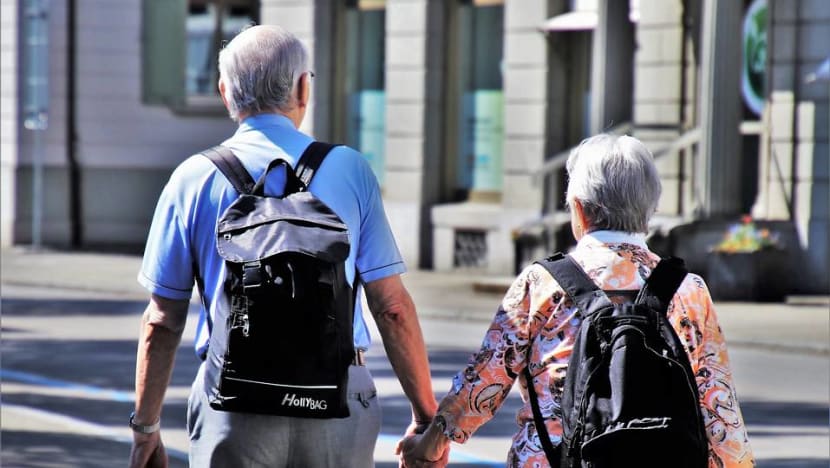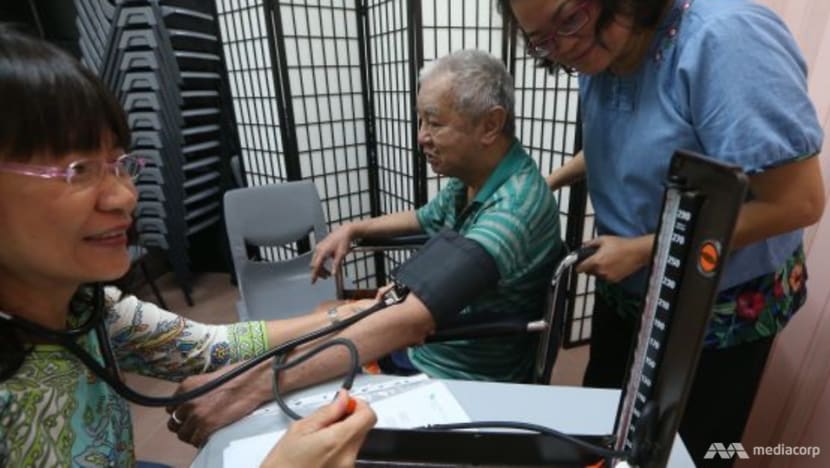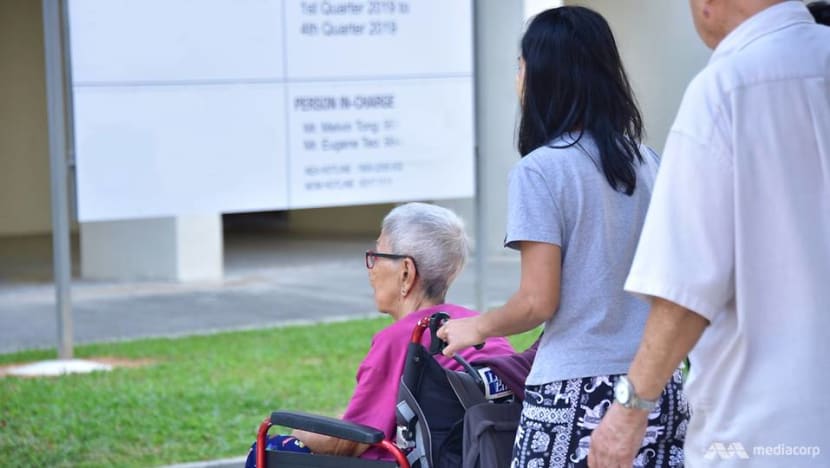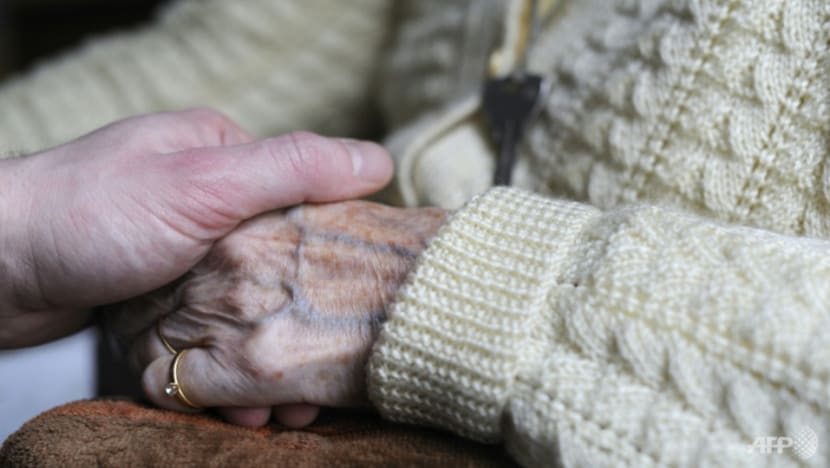commentary Commentary
Commentary: When memory fails in old age - the fight for independence, well-being shouldn’t be a lonely one
Comprehensive dementia care requires an integration of community and home-based support, say Duke NUS Medical School’s Centre for Ageing Research and Education’s Suen Johan and Ad Maulod.

Elderly couple holding hands (Photo: Pixabay)
SINGAPORE: Mdm M*, 65, has been diabetic since her thirties. In her fifties, she suffered a stroke that left her wheelchair-bound and almost entirely dependent on her husband, 72-year-old Mr M.
Four years ago, however, Mr M began showing drastic changes in behaviour. Mdm M recounted the day her husband defecated while they were on a public bus and the occasions when he locked her out of their home for several hours.
His condition worsened. Mdm M began to fear for her own life after Mr M stopped administering her insulin injections. He even threatened to stab her with the syringe at one point.
Mdm M made a distress call to a community befriender who, in turn, contacted a community nurse.
READ: Commentary: Living with dementia, anguish and guilt plague families caring for loved ones
Within a week, the community nurse made a home visit and observed that Mr M seemed to be in a perpetual state of confusion. Mr M was subsequently diagnosed with moderate-stage dementia.
The same nurse referred Mdm M and Mr M to non-profit organisation Tsao Foundation, which enrolled them into a comprehensive dementia care system within two weeks.
In Mdm and Mr M's case, an integrated ecosystem of community services and befrienders played a crucial role in promptly detecting and engaging them before they were subject to further jeopardy.
The couple now receives regular health checks and has access to a 24/7 helpline for their ad-hoc needs.

The system's holistic approach to care also provides financial support and house cleaning services on a regular basis.
A TEAM THAT CARES FOR THOSE LIVING WITH DEMENTIA
Dementia affects one in 10 people aged 60 and above. The number of persons with dementia in Singapore will more than double to 103,000 people by 2030.
Family caregivers of persons living with dementia are also significantly more stressed and suffer more severe depressive symptoms and physical problems than other caregivers.
READ: Commentary: The hidden strength of those caring for loved ones with dementia
Being diagnosed with dementia can be challenging to both the person receiving the diagnosis and his or her family members.
Much must be done to guide, educate, coach and support persons with dementia, their families, and any other caregivers.
This is a complex task that requires communication and counselling skills, an extensive knowledge of community services and available resources, as well as expertise in clinical gerontology, geriatric medicine and behavioural health.

Singapore’s healthcare system has not developed sufficiently to provide the comprehensive and user-centric support that persons newly diagnosed with dementia need.
However, there are shining models which have made a life-changing difference to many. In Whampoa, a Dementia Care System (DCS) has been implemented by Tsao Foundation to address this gap in service integration.
The DCS aims to achieve well-being for persons living with dementia such that they can continue to thrive while living in their community. The system also empowers caregivers to become more competent and confident in their care.
READ: Commentary: Opening earlier and more - some senior care centres in Taiwan take service to new levels
At the heart of the DCS is a multidisciplinary team comprising a nurse, a social work manager, and three Dementia Care Programme Assistants (DCPA), supported by a family physician experienced in geriatrics and dementia care.
These DCPAs are community aged-care workers who are especially skilled in working with those living with dementia. Through a comprehensive geriatric assessment, a progressive care plan would be designed and tailored to clients’ and caregivers’ needs, preferences and resources.
The DCS team meets regularly to discuss and update care plans to respond to improvements or deterioration in their clients' situations.
BROKERING CARE PLANS
When Mdm L, aged 78, first enrolled into the DCS, she was non-communicative and reclusive.
To ease her into the care programme, the DCS team started her out on activities such as visual arts, poetry, and other worksheets before introducing more interactive and physical activities.

After three months, her daughter reported that Mdm L had become more willing to socialise and showed significant improvement in her cognitive abilities.
The ability to exercise choice is important to the self-worth of persons with dementia. When Mdm K was diagnosed with dementia, she refused to attend the day centre as she felt she could be perceived as being “sick”.
The DCS team heard her. Instead of coaxing her to attend a day centre, they recommended home-based activities such as Chinese calligraphy and befriender visits.
READ: Missing items, temper tantrums and life shifts: One woman’s journey in caring for her mother-in-law with dementia
In addition, Mdm K’s family members were taught how to manage behavioural difficulties and create enjoyable and meaningful activities of therapeutic value.
Functioning like a broker, the DCS team connects families to services and agencies – inclusive of centre and home-based services – that match their needs, and more importantly, fulfil their desire to be cared for while living safely at home.
CARE FOR THE SENIOR CAREGIVER
Mr H, aged 84, struggles with his own health while caring for his 85-year-old wife who has dementia.
As he finds it difficult to read the labels, Mr H was often unsure about when and how much medication he should administer to his wife and himself.
READ: Commentary: Small things make a big difference in giving dementia patients the power of choice
To address this issue, the DCS team linked Mr H up with service providers who would monitor his medication compliance. According to Mr H, such assistance helped them avoid incidents of overdose.
The overall health and well-being of dementia family caregivers have a strong bearing on the quality of care they can provide. It is important that caregiver needs receive as much attention as the needs of those they care for.
HOW THE COMMUNITY CAN PLAY A PART
Singapore is ramping up efforts to improve the living environment and community inclusion of persons with dementia and their caregivers.
Eight Dementia-Friendly Communities (DFCs) have been set up since 2016. In these communities, residents, shopkeepers, stall owners, students and police officers volunteer to attend training sessions to recognise common symptoms of dementia and understand how to assist persons with dementia.

Singaporeans live in a care landscape that is rapidly developing, with the growth of many services over a short span of time.
Navigating these services, however, remains a challenge as their availability does not always equate to access for people who need them the most.
Furthermore, health and social services need to integrate seamlessly for these to be more impactful, sustainable and user-friendly.
READ: She couldn't help her dad - but now she's helping other dementia patients with tech
Most persons living with dementia in Singapore reside at home. It is therefore important we ensure appropriate support is provided to them in terms of the quantity, quality, timing and location of services.
Community-based programmes such as the DCS facilitate independence, reduce social isolation and sustain their most important source of support – the caregivers – for as long as possible.
*The individuals in this commentary are participants of a study by Duke-NUS Centre for Ageing Research and Education (CARE), which seeks to evaluate the impact of the DCS in meeting the needs of persons living with dementia and their caregivers in the Whampoa community under the Tsao Foundation’s Community for Successful Ageing (ComSA) Initiative.
Suen Johan is a sociologist and Ad Maulod is an anthropologist. Both are Research Fellows at Duke-NUS Medical School’s Centre for Ageing Research and Education.
















